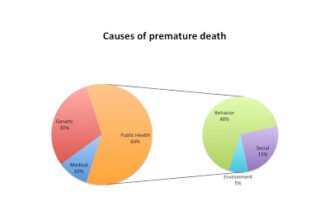I spoke with Harvard Business School professor Regina Herzlinger this week about health reform – the good, the bad and the ugly – touching on ACOs and demonstration projects under the Affordable Care Act; innovations coming down the pike in the private sector either because of the law or because of market forces; social media in health care; and two key fixes to the ACA that she believes are absolutely necessary in order to make it work, or work as best it c
I spoke with Harvard Business School professor Regina Herzlinger this week about health reform – the good, the bad and the ugly – touching on ACOs and demonstration projects under the Affordable Care Act; innovations coming down the pike in the private sector either because of the law or because of market forces; social media in health care; and two key fixes to the ACA that she believes are absolutely necessary in order to make it work, or work as best it can.
First of all, she expressed her delight at the passage of a federal law nudging us ever closer to universal coverage, combined with dismay at its failure to address rising costs (noting that we’re looking at policies yielding an accumulated Medicare deficit of $90 trillion, as compared to an annual GDP of $12-14 trillion) and at the paltry fines to be leveled at noncompliant employers that do not offer health insurance as required. As rational actors, she expects that more and more employers will simply opt out of the health care insurance market one way or another: gaming the system to avoid coverage requirements, paying fines that are less costly than insurance, and/or handing employees cash to put towards their own health insurance rather than arranging for a group plan, leaving the range of future health plans to be hammered out by insurers, state health insurance exchanges, and individuals. This outcome will be to the detriment of the insurers, who will be selling policies to individuals rather than groups (and, I must point out, whose underwriting practices will be constrained in the face of community rating mandates in the ACA); some of these individuals will be given the cash needed for insurance premiums by their employers. Herzlinger cited a recent McKinsey survey of employers (though its methodology and conclusions have been roundly criticized by some), endorsing its prediction of a widespread flight by employers from the field of employment-based health insurance.
Herzlinger said that she sees the Medicare shared savings program (aka the ACO program) as a wholesale failure, unworkable because of the assumption build into the model that a single organization can effectively and efficiently manage all care for a population of patients. Her preferred approach (as outlined in her 2007 book, Who Killed Health Care?) is the development of specialty care organizations (“focused factories,” anyone? She came up with the term a while back) focusing, say, on CHF – including all key CHF comorbidities. I am not convinced that this is a complete solution, since patients arrive as bundles of symptoms, not labeled with diagnoses, so there is a significant role to be played by primary care providers and others who do not necessarily fit into the focused factory model. However, there is merit to the notion that a system of providers and payments may be cobbled together in a manner different from the approach laid out in the proposed shared savings program regulations. (See my earlier post on Jeff Goldsmith’s critique of the ACO concept, in which I suggest that his ideas should be welcome in the world of commercial ACOs; in addition, given the tremendous felxibility shown by CMS in promulgating the proposed ACO regulations — for example, downside risk added to the mix despite being left out of the statute — perhaps there will be a place for Goldsmith’s proposed differential payment schemes for PCPs, EDs and focused factories.) Despite the narrowing of patient choice due to the development of commercial proto-ACOs and other payor-provider alliances, Herzlinger has yet to throw in the towel on her vision of consumer-driven healthcare. She is focused on the notion that, as employers move in the direction of providing additional cash compensation to employees in lieu of group insurance plans, consumer-driven healthcare will thrive, since consumers – not employers – will be the purchasers of services, and providers, despite being squeezed by payors, will need to be more responsive to consumer demands. Wearing my Society for Participatory Medicine hat, and as a patient myself from time to time, I like this line of thinking.
I also tended to agree with Herzlinger’s take on health care social media as a critical tool in the armamentarium, to be used by providers and patients in order to improve health care for all. (If interested in further reading I commend to you a recent piece of mine on issues surrounding the use of social media by health care providers.)
Finally, in response to my inquiry about what aspects of the ACA she expects to see amended in the near future, Herzlinger shied away from some of the issues being debated today (e.g., significant changes to the Medicaid program in order to forestall budgetary disaster at the state level, or waivers of the federales’ state-level health insurance exchange structure, otherwise not obtainable for the first three years under the law, to assist early adopters like Massachusetts) and focused on two specific issues:
(1) The need for an amendment to the tax code so that cash payments by employers to employees, intended to be spent on health insurance premiums, will not be taxable as income to the employee (in order to mirror the economic effect of the tax treatment of health care benefits); and
(2) The need for better transparency in health care, so that patients/consumers can have as much information available to them as they would when it comes to making a purchasing decision about any big-ticket consumer item (car, refrigerator, etc.), including, for example, outcomes quality data. We closed by agreeing that Todd Park has been doing a bang-up job in granting access to the tremendous store of data held by HHS, and hoping that his office would continue to expand its offerings.
Please have a listen to part of our conversation — after extending a health insurance supermarket analogy just a little too far, technology struck back and deep-sixed part of the recording.
The audio file of my interview with Regina Herzlinger is available for download/podcast (the first 10 minutes or so, anyway; the rest was eaten by gremlins).
David Harlow
The Harlow Group LLC
Health Care Law and Consulting








